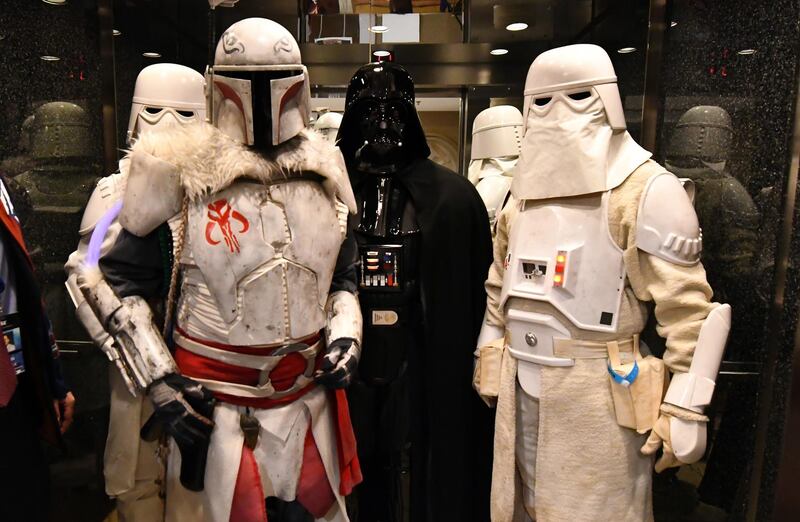It’s a bit of an understatement to say that last week was big for Disney.
Ordinarily, the release of a new Star Wars movie – in this case The Last Jedi – would be a mega-event on its own, but the company also went and acquired most of fellow entertainment giant 21st Century Fox for a whopping announced price of US$52.4 billion.
Sorry Luke Skywalker, you’ve been overshadowed. The Fox deal isn’t just huge for Disney, it also stands to reshape the global streaming landscape.
In acquiring Fox's non-news properties, Disney is getting the rights to some of the planet's most valuable entertainment brands, including The Simpsons, Avatar and X-Men. That adds to an already impressive content arsenal that includes Star Wars, of course, but also Marvel superheroes, Pixar and ESPN sports.
Disney also gets Fox's cable entertainment networks, which include FX and National Geographic, among others. With those come a host of critically acclaimed television shows, such as The Americans and Atlanta. As Barclays analysts point out, the only US cable network that has won more television Emmy awards than FX in the past five years is HBO.
Lastly, the deal also gives Disney majority control over popular US streaming service Hulu, with cable providers Comcast and Time Warner having the remaining 40 per cent. With an estimated 15 million subscribers, Hulu is the third-largest streaming service in the United States, behind Netflix and Amazon Prime Video.
All told, if it’s a battle Netflix wants, then Disney is coming full bore. If the House of Mouse was to combine all of of its properties into a single service, it would arguably be enough to blow Netfilx and the rest of its competitors out of the water.
Blockbuster movies, children’s programming, live sports, award-winning comedies and drama – Disney literally has it all. If the company wanted to, it could easily become a one-stop entertainment shop for the majority of households, a status that Netflix currently holds with its 110 million subscribers.
Fortunately for competitors, but maybe not so much for consumers, the company doesn’t appear to be interested in serving up that single, all-you-can-eat buffet.
The chief executive Bob Iger, who has agreed to stay on board till at least 2021, is suggesting that customers should be free to be “choosy”. To that end, Disney is likely to field at least three separate subscription services.
___________
Read more:
Disney sale trims Murdoch empire back to what he knows best
Sports broadcasting may see digital and traditional combine
___________
Announced earlier this year, an ESPN sports service is launching in 2018 at an unknown price, followed in 2019 by a separate Disney-themed offering that will be stacked with movies and TV shows.
Hulu, which is currently available in the United States at $8 a month, now becomes the third prong, even though its future is a little uncertain. The service currently delivers television shows from its various controlling members, but how that dichotomy will align now that Disney gets to call the shots remains to be seen.
Nevertheless, Hulu is a valuable brand that will likely continue on in some form. It could become a repository for more of Disney’s less-family oriented content. Marvel, Star Wars and Pixar properties could conceivably be put on to the company’s core streaming service, while FX shows and other adult-focused dramas will find their home on Hulu.
With full control, there also isn’t much stopping Disney from finally expanding Hulu internationally. Doing so could be a boon for other TV producers, since it would give them a third global option – besides Netflix and Amazon – to whom they could sell their programming.
Those two technology companies are sure to feel the heat from this emergent megalith as a result, but not nearly as much as other fledgling streaming providers – namely, Apple, CBS and HBO.
Apple had a busy week too with the announcement that Battlestar Galactica developer Ronald D Moore is coming on board to head up a new science-fiction series for its nascent video service.
CBS, meanwhile, is gearing up for the international expansion of its All Access streaming service, starting next year. It will be home to the network's cataloueg of shows, including Star Trek: Discovery, The Big Bang Theory and NCIS.
Time Warner-owned HBO, for its part, has been relatively quiet about its streaming ambitions. The network announced in February its US-only HBO Now service had hit two million subscribers, but it has largely kept mum about international expansion plans since.
Regardless of where they are currently at, these individual efforts and content catalogues now look quaint in the face of the juggernaut that Disney has assembled. With surveys showing that most consumers are likely to subscribe to only two or three streaming services, time is starting to run out for those who are still jockeying for position.
Just like the good guys in the Star Wars movies, the upstarts and wannabes are staring a veritable Death Star in the face.
That’s why it will notbe surprising to see more mega-deals – or rebel alliances, as it were – form up to take on this new entertainment empire as 2018 unfolds.





